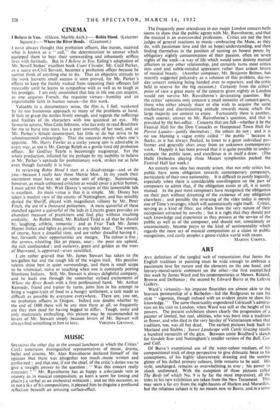CINEMA
I Believe in You. (Odeon, Marble Arch.)—Robin Hood. (Leicester Square.)--Where the River Bends. (Gaumont.)
I HAVE always thought that probation officers, like nurses, received what is known as a " call," the determination to answer which equipped them to bear their unrewarding and inhumanly selfless lives with fortitude. But in I Believe in You, Ealing's adaptation of Mr. Sewell Stokes' excellent book Court Circular, Mr. Cecil Parker, as a suave ex-Civil Servant, becomes a probation officer because he cannot think of anything else to do. That an objective attitude to the work harvests small success is soon proved, for Mr. Parker's efforts to keep the freshly wicked from repeating their offences fail miserably until he learns to sympathise with as well as to laugh at his protégés. I am only astonished that late in life one can acquire, as one acquires French, the requisite virtues—humility and an imperishable faith in human nature—for this work.
Valuable in a documentary sense, the film is, I feel, weakened by its too humorous approach to many of the problems at hand. It fails to grasp the nettles firmly enough, and regards the sufferings and frailties of its characters with too quizzical an eye. My favourite actress, Miss Celia Johnson, who has only to read Bradshaw for me to burst into tears, has a part unworthy of her steel, and, as Mr. Parker's female counterpart, has little to do but strive to be schoolmarmish endearingly. That she succeeds merely whets one's appetite. Mr. Harry Fowler as a cocky young spiv is admirable in every way, as too is Mr. George Relph as a gentle tired old probation officer. Sir Godfrey Tearle is becomingly magisterial. Yet the whole production, infected for me perhaps by my inability to believe in Mr. Parker's aptitude for probationary work, strikes me as false even though factually it is true.
In reviewing Robin Hood I start at a disadvantage—and so do you—because I really hate those Merrie Men. In my youth their merriment must have set up some sort of allergy. Summoning, however, as much unbiassed criticism as would cover a jerkin button, 1 must admit that Mr. Walt Disney's version of this lamentable tale is excellent. Its main virtue is that it is simple. Mr. Disney has taken a modest view of the county of Nottingham, and has sensibly denied the Sheriff, played with magnificent villainy by Mr. Peter Finch, the use of a thousand policemen. A mere quiverful of these matched against a quiverful of the lads in Lincoln green provides an abundant measure of prankiness and foul play without insulting credulity. As Robin Hood, Mr. Richard Todd is all that he should be, laughing, athletic, romantic ' • and as Friar Tuck Mr. James Hayter frolics and fights as jovially as any teddy bear. The women, of course, have a dreadful time, and are rather dreadful having it ; but, forsooth, their opportunities are meagre. The colour is fine ; the arrows, whistling like jet planes, soar ; the poor are upheld, the rich confounded ; and outlawry, green and golden as the trees of Sherwood, is approved—even sanctified.
I am rather grieved that Mr. James Stewart has taken to the ten-gallon hat and the rough life of the wagon trail. His peculiar talents shine best in quiet surroundings, and there is small scope to be whimsical, naive or touching when one is constantly potting Shoshone Indians. Still, Mr. Stewart is always delightful company, and he leads one through the somewhat stylised excitements of Where the River Bends with a firm professional hand. Mr. Arthur Kennedy, friend and traitor by turns, joins him in his attempt to bring a wagon-train of food to a hungry settlement, a task made as difficult as possible by everyone everywhere. There are, you see, no probation officers in Oregon. Indeed one doubts whether by the end of 1880 there will be any men there at all, so frequently are they shot dead for having begged to differ. Tough, noisy and only moderately enthralling, this picture may be recommended to lovers of Mr. Stewart simply because lovers of Mr. Stewart will
always find something in him to love. VIRGINIA GRAHAM.










































 Previous page
Previous page